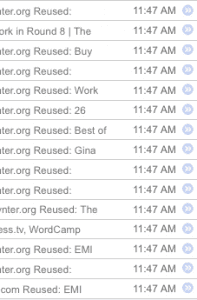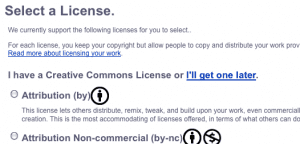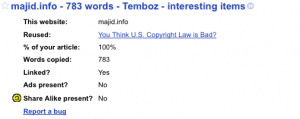Attributor Announces FairShare Service
 Content tracking company Attributor has announced a private beta of its first customer-facing service, FairShare. Best of all, as a Plagiarism Today reader, you have access to one of 500 beta invites to try the service out by visiting this sign up link and using the invite code “PlagiarismToday”.
Content tracking company Attributor has announced a private beta of its first customer-facing service, FairShare. Best of all, as a Plagiarism Today reader, you have access to one of 500 beta invites to try the service out by visiting this sign up link and using the invite code “PlagiarismToday”.
FairShare, unlike Attributor’s current business service, is targeted at bloggers and Webmasters who want to track how their content is being used and where, but do not require advanced tools and filtering. It works with Creative Commons licenses and tracks where content reappears, how much is used, if the content is linked and if the site displays any advertisements.
Though the service carries with it many different limitations, for bloggers that can not afford or don’t have the time to use a more advanced system, it is likely a very good choice.
How it Works
The principle behind FairShare is simple. After registering for the service, users are then asked to provide the URL of their feed. Then, after doing so, they are asked to select a Creative Commons License (if any) for their work.
Once the process is completed, they are then given the URL of a new feed to follow. It is a feed that will contain the matches that FairShare detects, using similar, though slightly more limited, technology as the regular Attributor system.
The feed will list information about the matches including the domain that the match was found on, the percentage of the original article that was copied, the number of words copied, whether the match site links back, whether it displays ads and provide a link to a FairShare comparison page, where the creator can look at the two works side by side.
If the content has a Creative Commons License, the feed will also show you if each of the elements are compliant with the terms you set forth.
The idea behind FairShare is that users will be able to go through their feed in their regular reader, see which matches are compliant, do comparisons on those which are not and then take appropriate action on their own.
The Good
 The greatest advantage of FairShare is that it takes simplicity to a new extreme. Outside of selecting your license, there are no options to deal with or figure out. You simply provide the site your feed, select your content license and subscribe to the RSS feed it generates. Nothing more needs to be done.
The greatest advantage of FairShare is that it takes simplicity to a new extreme. Outside of selecting your license, there are no options to deal with or figure out. You simply provide the site your feed, select your content license and subscribe to the RSS feed it generates. Nothing more needs to be done.
The matching technology of FairShare seems to be very solid overall. FairShare and Attributor both rely on their own search engine and database, instead of using Google or Yahoo!. Though this is a risky move that has not worked well for others, usually due to limited database size, it seems Attributor’s results are about on par with results that can be achieved through hand Google searches.
All totaled, FairShare and Attributor both use the same database of roughly 35 billion pages, making it many times larger than most similar services.
FairShare also works with nearly 20 different languages, with more likely on the way, making one of the only choices for many international users.
Finally, the FairShare service is completely free. Though Attributor has not announced if they plan to release a more advanced pay version at a later date, the service is completely free to use and test. If one decides that they no longer want to use the service, all that they have to do is unsubscribe from the feed(s).
FairShare holds a great deal of promise for small to medium sized bloggers. However, this is not to say that the service is right for everyone nor that it is without its limitations.
Drawbacks and Limitations
 Though the simplicity of FairShare is one of its greatest strengths, it is also a weakness. The user currently has no control over the exact matches they receive. Many of the matches are going to be ones that are barely over the limit for detection and may not be of much interest to the user. Also, if the user is only interested in matches that are infringing, they’ll have to wade through results that are compliant with their license. Users can, however, subscribe to a weekly summary feed and Attributor does plan to introduce more feed options in the future.
Though the simplicity of FairShare is one of its greatest strengths, it is also a weakness. The user currently has no control over the exact matches they receive. Many of the matches are going to be ones that are barely over the limit for detection and may not be of much interest to the user. Also, if the user is only interested in matches that are infringing, they’ll have to wade through results that are compliant with their license. Users can, however, subscribe to a weekly summary feed and Attributor does plan to introduce more feed options in the future.
(Note: The feed to my right is not the FairShare feed for PT but for another, much larger, site that I work with.)
Second, also related to the issue of simplicity, there is no way to filter or sort though the matches. There is no way to prioritize or organize matches using the system, unless one uses an RSS reader that makes it possible to do so on their local computer. Even then though, the filtering and sorting will have to be done by hand.
Also, the FairShare system has no compliance tools built in. Though it can help users detect matches of user-supplied content, it is their responsibility to determine what they want to do about any infringements and how they want to do it.
The FairShare system is also limited in its reliance on RSS. Sites that do not have RSS will not be able to use the service and sites that use partial feeds may not get very good matches. Also, the service will not parse any content not on your feed, meaning that pages and content too old for the feed will not be checked. However, unlike Copygator, the service WILL find matches on non-RSS sites.
Finally, sites that have a large volume of matches will find themselves quickly buried in the number of results produced. FairShare feeds can easily produce hundreds of results per day, many of them not of a high priority, forcing a Webmaster to go through the feed every few hours and make quick decisions about which cases to follow up on.
In short, the service is a good solution for small to medium-sized bloggers that don’t expect to see more than a few dozen matches per day. More established ones might need a more advanced solution to avoid being buried in a large number of results that can’t be easily filtered.
Future Plans
As mentioned above, Attributor has stated that they plan on expanding their FairShare offerings by including more feed choices, allowing users to only receive the matches that they want. Also, they plan to provide additional licensing options, for those that don’t wish to use their own license scheme instead of a CC license.
Obviously many of these features will be available only farther down the the beta cycle, but may be reasons for some to consider jumping on board now and seeing how the service works, even if it is not a current match for them right now.
Conclusions
Overall, FairShare is a system to be extremely excited about. For most bloggers the system will work very well and provide all of the power that they need. Though others may require a more advanced system to help them sort through and prioritize matches, most bloggers will not have that issue.
Considering that the service is free, there is little harm in trying it. As I mentioned above, users can unsubscribe from their FairShare feeds at any time if they feel that the service isn’t working.
Despite it’s flaws and limitations, FairShare does provide a great deal to get excited about, namely that it is a simple, free content tracking tool that uses technology on par with a professional service. Though the system is still in beta, and users should expect a few bugs from time to time, it has worked fairly well in my testing and is worth at least a shot.
Disclosure: I have worked as a consultant for Attributor.
Want to Reuse or Republish this Content?
If you want to feature this article in your site, classroom or elsewhere, just let us know! We usually grant permission within 24 hours.


